In casting
the title character of the film A Monster Calls, a forty-foot
tall behemoth made of trees and earth who helps a small child come to
cope with the impending death of his mother, you just can’t have the
normal casting call. The actor must have a certain gravitas, a certain
degree of threat, and a certain compassion.
It is
hardly surprising that the filmmakers immediately turned to
Oscar-winning actor Liam Neeson.
“From
the moment you start to think about an actor for the monster, because he
was based... on the Green Man, who is one of the biggest characters in
the Celtic traditions, you start to think about who is the Irish actor
who can bring the presence, the voice, the soul. the wisdom,” explained
director J.A. Bayona. “Of course, it was Liam Neeson, the first name
that came to my mind.”
“For the
film, Liam Neeson would always be the top of your list,” novelist and
screenwriter Patrick Ness agreed. “Because someone is on the top of
your list, you always assume you’re not going to get them. But we did,
he responded and it was great.”
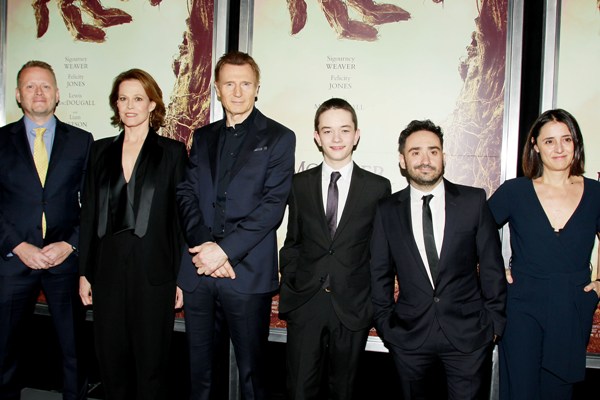 Playing
the monster was Neeson’s first experience with motion capture filming, a
technique that was a little uncomfortable for the veteran actor to
start, though he is thrilled with the results.
Playing
the monster was Neeson’s first experience with motion capture filming, a
technique that was a little uncomfortable for the veteran actor to
start, though he is thrilled with the results.
Based
upon the popular 2011 young adult novel of the same title by Patrick
Ness, A Monster Calls tells the story of a young Irish schoolboy
who meets (or imagines) a giant monster to help him come to terms with
his unhappy school life and the inevitable death of his ill mother.
Playing
the monster was a change of pace for Neeson, and yet the role takes
advantage of the specialize skills that have been obvious in the actor
for decades. Whether playing brave heroes (in his Oscar-nominated role
for Schindler’s List, as well as Michael Collins and
Excalibur), troubled mentors (in the likes of Batman
Begins and Star Wars: The Phantom Menace), to his newer
specialty as aging action hero (in the likes of Taken and A
Walk Amongst the Tombstones), Neeson has always brought an electric
presence to his roles.
A couple
of weeks before the New York and Los Angeles Christmas release of A
Monster Calls (it will be spreading wider in early January), we were
one of several media outlets lucky enough to sit down with Neeson and
discuss the film.
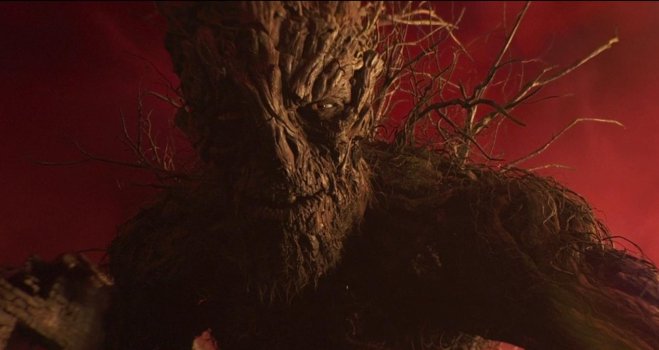 What
was it like to see yourself as a gigantic tree?
What
was it like to see yourself as a gigantic tree?
(excited) It was pretty cool.
They had shown me a mock up, the bust [that director] J.A. [Bayona]
imagined, when we started rehearsals for the motion capture stuff. I
thought, oh my God, that looks really interesting. It kind of looked as
if it was someone who had walked into a tree. The face had all been
squashed. That helped inform me of how this thing might speak. With
trouble breathing. Takes his breath from the graveyard in some way. It
would be quite spectral. So it was lovely. The motion capture, I’d
never done that stuff before.
What
was that experience like, acting while in a motion capture suit?
The
first day, I felt like a twat. Where I come from that doesn’t mean [the
same sexual connotation as in the US].... It’s just, I felt like a
jerk. You’re in a onesie with ping pong balls all over your body
attached to sensors. There’s five computer nerds behind laptops and
they are supplying you with.... Well, I forgot to say, you’re out in
space, but they don’t call it space, because they are computer nerds.
It’s called “The Volume.“ There are 70 cameras going around in a
circle, and there are 70 cameras overhead. The acting space – I’d call
it in the middle, they’d call it the volume – I’d be acting to a puppet
that size (indicates a little one with his hands). Lewis would
be off camera, supplying these extraordinary emotions, even though he’s
off camera. Then the computer nerds are giving you this digital make
up. So, when we’d shoot a scene, J.A. would show it to me, roughly what
it would look like. It was an extraordinary process.
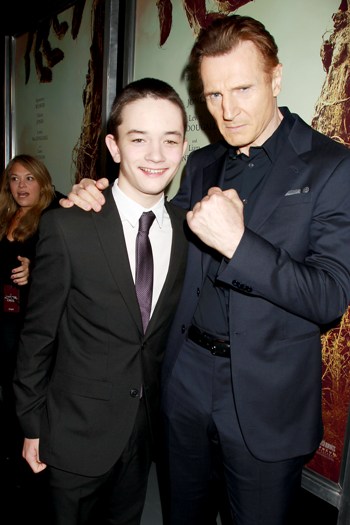 What
was it like to see the book come to life on the big screen?
What
was it like to see the book come to life on the big screen?
I would
have to say I was really drawn into it. The story. It’s an
extraordinary book. Patrick did a wonderful adaptation from the book.
I saw a cut version – it wasn’t complete – about six months ago, maybe.
It was really telling it, this story, I have to say. [Lewis MacDougall]
embarrasses Shakespeare’s Hamlet with the range of stuff he has
there. Really remarkable, I think. And it wasn’t a performance. There
was no acting. Certainly not when I was with him. He’s terrific.
Terrific what that kid does. It’s real. He makes it real. There’s not
an ounce of sentiment. Just terrific. I can’t praise that boy enough.
When
you were a kid, did you have any recurring nightmares?
Well,
I’ll tell you, I had crazy dreams. My sister and I used to go to a
little picture house in my time. There would be Saturday matinees and
stuff. I used to get terrified – but obsessed at the same time – with
these black and white B-movies about mummies. [They] were absolutely
terrifying to me. Even though the heroine or hero would be sprinting
away, and those things (mimes holding out hands and shuffling,
stumbling forward), they’d still catch up with them. But that
didn’t matter. So, when I read the script to this, that came and
conjured that. That brought that back to me. This terrifying thing:
all it wanted was its princess to go and die with it again. The mummy’s
myth. So it wasn’t really evil, but at that age it was very, very scary
to me. And my sister.
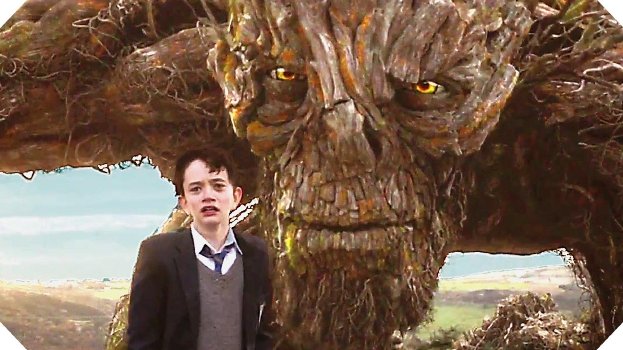 Patrick
just said you were his ideal choice to play the monster. When did you
know this was something you really had to do?
Patrick
just said you were his ideal choice to play the monster. When did you
know this was something you really had to do?
He cut
the check. (laughs) Yeah, I did. I felt that. I had seen
J.A.’s The Impossible. I thought it was a terrific film. I’m a
big fan of Ewan [McGregor]’s and Naomi [Watts]’, but these kids were
extraordinary. I thought that he’s got to be another Steven Spielberg
if he can bring performances like that from these children. I thought,
okay, A Monster Calls, he’s obviously picked some special kid.
So that was the allure to it, you know? And, obviously, to work with
the same Pan’s Labyrinth team, which is an extraordinary film.
Had you seen Lewis [in his first role] in
Pan?
I didn’t
see that. I haven’t seen it. No. He’s just, I think he did a film in
May with one of my favorite actresses, Vera Farmiga [called
Boundaries]. She is great. I just did a movie [The Commuter]
with Jaume Collet-Serra – this is our fourth [they had previously worked
together on Unknown, Non-Stop and Run All Night] – another
Spaniard. [It was filmed] in London. It’s a thriller. We had Vera for
four or five days. I was like a kid in a toy shop with her.
You
really pretty much only worked with Lewis as far as the actors go.
Yes, it
was all with Lewis, yeah.
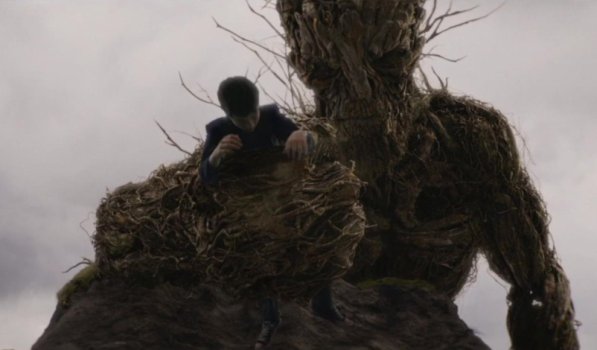 Did
you feel fatherly with him at all? Did you have any advice for him?
Did
you feel fatherly with him at all? Did you have any advice for him?
I
didn’t. Because he and J.A. were very close. J.A., I think one of the
cores he has is he never talks down to a kid, I sense. It’s one on
one. It’s very much an equal. No, I didn’t dare offer him any advice.
I didn’t. We had a few laughs, too. He’s a kid. I’m a kid, too.
(laughs) We get to play monsters, you know? It’s important to keep
sometimes a lightness of touch. That doesn’t mean you treat the whole
thing as fun, but just keep a [casual feeling], because the story has
quite [a lot of] gravitas. It’s important sometimes with kids to
just keep it light.
Did
you find a lot of darkness in this children’s story, a lot of scariness?
Oh,
sure. Yeah, yeah, yeah. Yeah. I don’t know if you’ve read the book at
all...
No, I
haven’t had the chance yet...
It’s a
very, very quick read. It was a very deceptive read. You read it and
go, oh, that’s nice. You put it down and suddenly you start thinking
about it again. I certainly did. I would pick it up, in fact, I was
reading bits of it last night. It does weave a special web around you.
I think it’s a classic. I would rate it with the best of Oscar Wilde’s
fairy tales, and certainly the Brothers Grimm. I think it’s one for the
ages. I really do.
One
thing I liked about it was that it could be very subtle. For instance,
in that section where they just pan over the family photos on the wall
and show that you were the grandfather. No fuss is made about the
reveal, you could easily miss it, and yet it opens up so many
possibilities for the story.
Oh,
yes. Yeah, yeah. Yeah, the camera just passes it.
You
start to think, well, okay, is he the grandfather, or...?
Well, I
think that Conor has conjured up this presence that is a mixture of his
mother’s early drawings that he remembers, his grandfather, and
certainly this yew tree that has been part of his life. It’s just way
in the back there somewhere. He’s just blended them all together, as
only kids can do.
Was
that picture taken on set?
We did a
shot after we wrapped the motion capture stuff, I think. It was a set
up, a make-pretend family.
What
do you think the monster represents for Conor?
It’s got
to approach the fear that he has, that he can’t quite put up....
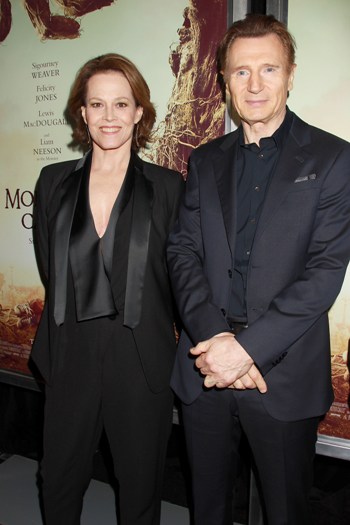 And
it could be a guy?
And
it could be a guy?
I think
so, yeah. It could easily be, you could say it’s his grandmother, too.
Sigourney Weaver’s character, who you think is very cold and unfeeling,
but she’s about to lose her daughter, too. That’s interesting. I
wonder if it would have had the same effect if the tree would have been
a woman. I’ll have to think about that, actually.
It’s
such a fine line between the monster and the guide in that particular
character. How did you find yourself voicing that?
Yes. I
mean, I knew the computer guys were going to sort of [make him] – not
quite hideous, but this ancient sort of tree. A quite scary figure. I
knew they were going to do that, so I don’t have to do that. Certainly
worked on the voice a little bit, and I knew that also the sound guys
would play with that as well, wherever they saw fit. To make it more...
I don’t know, whatever they do to it. Adjust it to make it more raspy,
or softer. They can do all that stuff. I just played it as I thought
it should be played. Sometimes – certainly telling the tales, because
they are quite involved tales – they had to be delivered quite punchily.
That’s what life is like. It’s like: “Get on the train, here’s the
story, dude. I’m telling it to you. This is the way it is.” The kid
is trying to take all these images in. We, as the audience, are taking
these extraordinary animated images in. Then suddenly you’re hit with
the guy killed his own wife. He killed her for political reasons. And
you go, “What???” Each tale is kind of like that, so I felt they should
be delivered not in a “bum, bum, bum” (knocks on table three times,
slowly and rhythmically) but they should go (snaps his fingers)
drive like the carriage. Just little things like that. Then J.A. and
I, would talk and he’d say, “You’re going too fast, or too hard. Maybe
just pull back a bit.” Or whatever.
How
does J.A. Bayona compare to the other directors you have worked with?
You have said he is terrific with children.
I may
have said this already, forgive me if I’m repeating myself – he is like
Steven Spielberg that way. Steven has this magical relationship with
children. When you think of Drew Barrymore in ET, it’s an
extraordinary performance he brings from this girl. I’ve seen him –
well, I’ve worked with him – but I’ve seen him in action with kids and
he’s just... he and the kids are on the same level. J.A. was the same
with Lewis. I’d see them huddled in a corner. J.A. would never give
him personal direction in front of me, or his father. He’d bring him
off and would quietly talk to him, which is very, very considerate. A
lot of directors wouldn’t do that. I could see Lewis nodding his head.
The two of them were like two kids, really sharing a confidence with
each other. That’s part of his talent, too. It was magic. And his
care. His genuine care and concern.
I hope this doesn’t get swallowed up by
Rogue One.
(joking) What’s Rogue One?
Do
you think the film should be mandatory viewing for those who have not
experienced grief and death?
And
maybe for those who have experienced it. I just lost a very dear
relative of mine. [She] died of breast cancer in her forties. It’s a
horrible, horrible disease. It’s wonderful a film like this can really
confront something like that. A lesson you can take away from it is: we
all live in hope, but sometimes it’s important to confront something for
what it is. If you have two weeks left, or three weeks, maximum, it’s
important that a family hears that. And the kids hear it, too. I think
that really comes across in the film. They are dancing circles... well,
they’re not dancing circles around the character of Conor, he’s
desperate to be told the truth. They’re saying “Not now...” or “You
wouldn’t understand.” That’s infuriating for a kid. It’s infuriating
for an adult, but infuriating for a kid to hear that, because they can
take things onboard. They may not intellectualize what was there, but
they can grow to eventually understand it. And how important it is to
have support. If it’s not family, close friends and stuff to lean on,
talk to. The kid, the character of Conor, doesn’t, unfortunately.
That’s why he conjures this essence, this creature, that he can share
with.
CLICK
HERE TO SEE WHAT LIAM NEESON HAD TO SAY TO US IN 2004!
CLICK HERE TO SEE WHAT LEWIS MacDOUGALL HAD TO SAY
ABOUT A MONSTER CALLS!
Email us Let us know what you think.